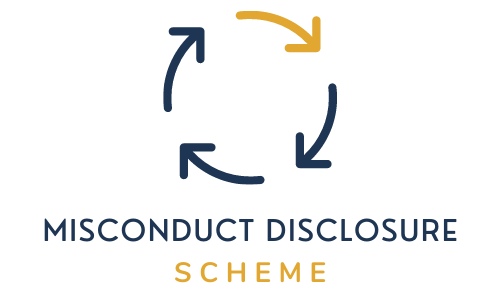Misconduct Disclosure Scheme
Advisory Panel
Recommendations - 2023
The MDS Advisory Panel recommended discussed and agreed the proposed changes to be ratified during the call on the 24th March 2023. These changes were confirmed by Andrew Morley, Chair of SCHR, on 12th May 2023.
The following changes have been proposed by the MDS Implementing Organisations and the MDS Coordinator, in accordance with the governance process outlined here.
List of agreed changes:
1) Changes to the Template Statement of Conduct
It is suggested to remove footnote (ii) to avoid questions on proportionality and seriousness on the disclosed disciplinary measures where raised and require that all formal disciplinary measures on file should be reported, based on zero tolerance.
It is recommended to proceed with the amendment and remove the footnote, to avoid raising discretionary issues and align with zero tolerance policies. Implementing Organisations are and will continue to be reminded that the information gathered through the MDS check form base for fully independent and informed decision-making during the hiring process.
It is suggested to standardise option c) for Q 3.0, 3.1 and 3.2 to: “I am unable to provide an answer”. In discussions with Implementing Organisations, it was felt that this added complexity and confusion, as well as potential for legal grounds to question the disclosure of misconduct without providing additional useful insight to inform hiring decisions.
It is recommended to standardise option (c) for all three questions. To avoid an excessive simplification, a suggestion for direct follow-up in case more information is needed will be added in the notes.
2) Implementation Data. Change report item from: “The number of complaints and lawsuits relating to the implementation of the scheme” to: “The number of upheld complaints and lawsuits directly relating to the implementation of the scheme”
It is recommended to proceed with the amendment of the language, to clarify that complaints will be reported only if directly related to the Scheme and once validated in court.
3) Implement the delisting process agreed with Implementing organisations in 2019 as part of the annual reporting commitment, adding article 2.5 to the Scheme.
Given the increasing number of Implementing Organisations with the same available resources for follow-up, and to preserve the integrity and credibility of the Scheme, it is suggested that Implementing Organisations that do not respect the commitment to the annual data reporting be considered for delisting from the MDS. A case-by-case approach will continue to be applied (eg. Organisations communicating with time potential delays in data submission, change in focal point/relevant staff or other mitigating reasons for delays or lack of data, organisations that have joined after the month of September of the reporting year, etc).
The delisting process will be detailed in the MDS definition document, under a new article 2.5.
It is recommended to proceed with the addition of article 2.5 and the 2022 proposed process for initial delisting. A flexible approach is recommended particularly for this first round of delisting, and clear communication about the delisting process will be added to future communication to new Implementing Organisations and in occasion of the annual data collection, to clarify the expectations.
4) Expanding the scope of the Scheme to be applicable to other type of misconduct, beyond SEAH (interpersonal or financial misconduct)
Several Implementing Organisations have put forward the request to expand the scope of the Scheme to include other type of checks within the Statement of Conduct, to simplify the check process.
The Panel recommendation is to not expand the scope of the Scheme, to keep the focus on SEAH as a specific issue within the sector and maintain the original intent of the scheme’s authors . IOs are and will continue to be encouraged to adapt the MDS process to best fit their needs, including by adding the SoC as a section of their wider background checks, which may include similarly structured questions on other kinds of misconduct such as financial misconduct and bullying.
